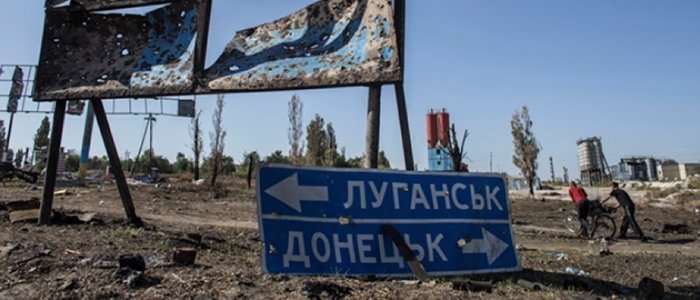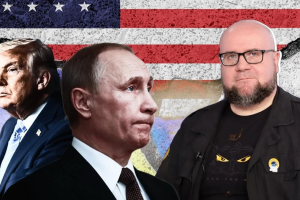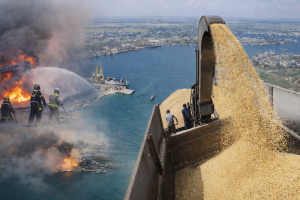Three years in the Minsk dead end: how did we get there and where to go from here?

February 12, 2018 marked the third year since the “Package of Measures for the Implementation of the Minsk Agreements” (better known as the Minsk Agreements) was signed. The document was endorsed in the capital of Belarus by envoys from Ukraine, Russia, the OSCE and the unrecognized “DPR” and “LPR”. At the time of its singing, it was viewed as a roadmap for de-escalation and a step-by-step settlement of the protracted armed conflict in Ukraine’s Donbas region.
However, the agreements, which were also endorsed by a separate resolution of the U.N. Security Council (№ 2202) in 2015, did not meet the expectations that the international community had entrusted to them. Despite the optimistic expectations for “Minsk II”, at best it became an instrument for relatively reducing the intensity of combat in the country’s east, and this has moved the Donbas conflict into a protracted phase of low-intensity confrontation.
As a result, Ukraine’s Donbas has for several years existed in an erratic state of sluggish war, and this has left a distinct impression on the attitude of Ukrainian citizens. Thus, some three-quarters of the population believe that “events in Ukraine are heading in the wrong direction” (74%). A similar percentage of people surveyed in December 2017 said that the main indicator for changing the country’s direction would be foremost “the end of the fighting and establishing peace in Donbas” (75%).
A recent survey by the International Republican Institute (IRI) also points to the problem of the armed conflict in Donbas as a priority among 42% of respondents in Ukraine alongside problems of corruption in government agencies (48%) and inflation (41%).
In light of such public attitudes, it could be said that a steady demand is being formed in Ukrainian society for a quick resolution to the overwhelming problem of war in Donbas. If the current situation in the region remains unchanged and the political elite continues to lack a clear response to the problem that has emerged, it might serve as a significant catalyst for Ukrainian society and a factor that would noticeably undermine confidence in the government as a whole.
Against the backdrop of Ukraine rapidly entering the next phase of the election race, it is becoming obvious that sidestepping the topic of Donbas (in light of the particular urgency of this issue for voters) will be quite difficult. Public demand for putting an end to the protracted conflict is extraordinarily high. In this regard, the key to winning the upcoming elections in 2019 will fall into the hands of those who will not be afraid to search for and offer creative solutions to one of the most topical problems that has faced the country in recent years.
The so called “De-Occupation Law” (“On the Peculiarities of State Policy on Ensuring Ukraine’s State Sovereignty Over Temporarily Occupied Territories in the Donetsk and Luhansk Oblasts”) that was recently adopted by parliament, notwithstanding the multitude of appropriate and necessary definitions (Russia as an aggressor state, the status of the occupied administrations of the Russian Federation in Donbas, the right for Ukraine to defend itself in accordance with Article 51 of the U.N. Charter), the law outlines only general policy approaches to reintegrating the Donbas and doesn’t provide an answer to the question of how to actually end the armed conflict.
Clearly, the law on its own cannot be an instrument for resolving the multidimensional conflict, the most important dimension of which is perhaps the geopolitical struggle between Russia and the West. The solution, accordingly, should be comprehensive in nature where legislative changes in Kyiv are only one component in a more complicated political and diplomatic game. Without the consolidated efforts of the international community in the context of finding peace, one can hardly hope for rapid success.
The Minsk Agreements still remain the main roadmap for resolving the Donbas conflict among Western countries; other coordinated options are absent for those who brokered the signing of the agreement. Berlin, Paris, and Washington have continually emphasized through their leaders the necessity of the implementation of the Minsk Agreements by each party of the conflict, including Ukraine and Russia.
However, the stumbling block for realizing the document lies not in the essence of its provisions, but in the sequence of their implementation. Whereas Moscow has emphatically called for expediently giving the self-proclaimed republics in Donbas special status based on proposed changes to Ukraine’s constitution, Kyiv has unremittingly appealed to logic and common sense with regard to the implementation of the political part of the agreements (special status, holding local elections etc.) – they should occur after sustainable solutions for basic security issues are in place. As is well known, an “immediate and comprehensive ceasefire”, as the first clause of the Minsk Agreement requires, has never taken hold in Donbas.
Although formally Minsk II didn’t include requirements for the sequential implementation of the agreement’s clauses, which is probably the document’s biggest flaw, Ukraine’s arguments for giving priority to security issues over political requirements appear to be quite logical and consistent.
In the absence of significant progress in achieving de-escalation of the Donbas conflict, the West has over time accepted Kyiv’s arguments and stopped insisting that the Ukrainian side implement the political part of Minsk II, agreeing that fundamental security issues must be resolved, including a comprehensive ceasefire in the combat zone.
Today, international diplomats and leaders of Western countries continue to try breathing life into the once much-touted Minsk Agreements. However, the outcome has been one of dubious success. Discounting the few exchanges of hostages and short-lived truces in Donbas, then generally speaking the agreements are limited in functionality as a settlement tool.
However, it is worthy to note that if Moscow decided to take decisive measures to pressure the representatives of the self-declared Donbas “republics” (that it effectively controls) to cease fire, then tangible problems could arise for Kyiv.
As is generally known, Ukraine’s political elites harbor a rather chilly attitude towards the document containing the signatures of the leaders of Donbas self-declared “republics” (DPR and LPR). A relatively fresh illustration of how the legislative corps perceives the Minsk Agreements is the negative reaction by a majority of MPs in the Verkhovna Rada to possibly referencing or even mentioning the Minsk Agreements in the recently adopted law on the de-occupation of Donbas (No.7163).
Still fresh in Ukraine’s memory are the tragic events of August 2015 when amendments to the Ukrainian Constitution regarding decentralization of power were voted on during their first reading in the Ukrainian parliament. Amendments to the Basic Law, which have not been definitively approved by the Verkhovna Rada of Ukraine, envisioned adding references to the “Minsk” law on the “Special Order of Self-Governance in the Separate Regions of Donetsk and Luhansk Oblasts” to the Transitional Provisions of the Ukrainian Constitution.
It’s worth noting that the rejection of the provisions contained in Minsk II by a number of political forces in Ukraine resonates well with the relevant attitudes of the Ukrainian society. Recent public opinion polls have found out that every second person polled in Ukraine (49%) realizes the necessity to “agree to certain comprises for the sake of achieving peace in Donbas.” However, a majority of these compromises that one way or another are defined in the Minsk Agreements – for example, amnesty to combatants, exclusive political and economic relations between SDDLO and Russia, fixing to the Constitution of Ukraine a “special status” for certain areas in the Donetsk and Luhansk oblasts – are not supported by a majority of Ukrainian citizens. Herewith, the level of support for the aforementioned compromises declines regionally the further west one is located from the East of Ukraine.
Thus, there are certain grounds to affirm that if serious attempts are made to implement the compromises foreseen in the Minsk Agreements, this has the potential to ignite another political crisis and could even split Ukrainian society. In the context of settling the Donbas conflict, citizens, according to public opinion polls, express readiness for compromise on an abstract level and often reject specific ones.
The Minsk Agreements over the three years of its existence still has not become an effective instrument for a long-term, sustainable resolution of the Donbas conflict. They also didn’t gain sufficient social and political legitimacy in Ukraine, which makes them replete with potential risks for the political stability of the country.
In light of this, it would be reasonable for Ukraine and the international community to focus their efforts on searching for new effective and proven mechanisms for conflict settlement. This could be, for instance, the introduction of the transitional UN interim administration in the temporarily uncontrolled (occupied) territories of Donbas with the support of peacekeeping forces.
The use of this mechanism would allow for the necessary conditions to be created step-by-step for settlement and the return of occupied territories of the Donetsk and Luhansk oblasts to Ukraine’s political and legal purview.
It is also important that such an international peacekeeping initiative would be embraced by Ukrainian society. Based on recent public opinion poll data, nearly every second Ukrainian (49%) agrees that a U.N. interim administration in Donbas backed by “blue helmets” would enable the process of settling the armed conflict in Donbas. This option of conflict settlement currently does not divide Ukrainian society and is supported by the absolute majority in Western and Central Ukraine, while in the East, South and in Donbas it is supported by the relative majority.
A long-term resolution to the war in Donbas and reintegrating occupied territories of the Donetsk and Luhansk oblasts into Ukraine requires more than measures that have time-proven effectiveness in international practice for achieving an end-goal. Also important is for the respective measures to have adequate public support in Ukraine and not generate new lines of political confrontation and divisions inside the country prior to the upcoming elections.








